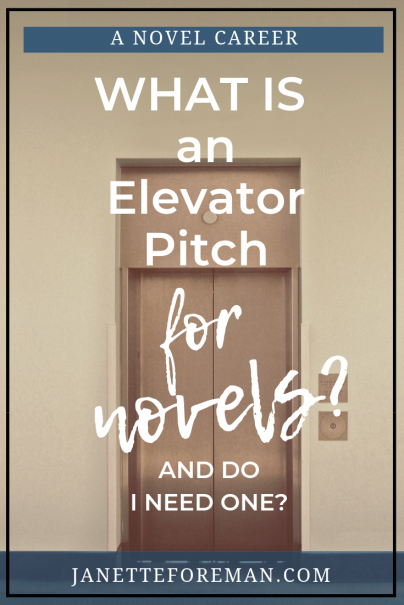Experts in the publishing field recommend that, when pitching (or really, even if you’re not), you come up with an elevator pitch for your novel. But what is an elevator pitch? And do you actually need one? In this post, we’ll look at elevator pitches and attempt to answer that question.

This post may contain affiliate links. For more information, see my disclosures page.
This post is part of a series about pitching you manuscript to an agent. To see the other posts in this series, check them out here:
What is An Elevator Pitch for Novels
(and Do I Need One)? (you are here!)
Others Coming Soon!
Let me tell you… I’m SO excited to talk with you today. Because what I’m about to mention was a total game changer for me! Not just in pitching at conferences but in book proposals, too.
(Seriously. I’m not just saying that. It really made a difference for me, and I’m super passionate about sharing it with you.)
Allow me to introduce to you to the powerhouse tool, The Elevator Pitch.
The Elevator Pitch...
Let’s say you step onto an elevator, and someone else comes in after you.
As the doors remain open and a few more conference attendees trickle in, the person turns to you.
She introduces herself. “What do you write?”
The nerves build inside you as you answer with your genre.
“Oh, fun! Me too,” she answers. “What is your book about?”
The dreaded question.
You blink.
… My book? Umm… What IS my book about?
And no matter what you do, you can’t figure out a distinct path to take in your explanation.

Crickets. And then the elevator ride is over and the attendee is on her merry way. Oops.
If only you could have known what to say.
Common answers to that question
If you’ve ever found yourself in this situation, you might have answered in one of these ways…
- Launched into an explanation of the characters and their back story
- Rambled on and say stuff like, “Oh, well, you know…”
- Basically started on page 1 of your manuscript and offered up a play-by-play
- Or maybe you froze. Prayed the elevator ride would end soon.
Well, here’s the thing. That elevator ride WILL end. Sooner than you think. And your riding buddy is left staring at you, perhaps with eyebrow quirked while you’ve got nothin’.
Awkward city…
Let’s just avoid that situation, okay?
Instead, let's prepare you for an elevator pitch
They have a strange name. And don’t really have much to do with elevators, except in theory.
But they are essentially VITAL when it comes to potentially getting the attention of literary agents and editors, both at conference pitching appointments and within your book proposals.
When it comes to preparing to pitch your manuscript, the elevator pitch is a step you definitely don’t want to skip. (Just think if it had been an agent or editor in the elevator with you, instead of a fellow writer, and an opportunity was lost.)
And the potency of the elevator pitch reaches beyond a conference meeting and a book proposal you’re emailing to an agent.
It has the potential to help your agent pitch the book to editors. Editors can use it to pitch to the pub board. The sales team can use it to pitch to retail spaces. Publicists can use it to pitch to reviewers. And ultimately, it can aid in crafting back cover copy that entices readers to buy the book.
An elevator pitch is THAT important.
But what is an elevator pitch anyway?
Let’s dive in…
First, the main thing to remember… Your elevator pitch is NOT your story blurb.
Did you know that? I certainly didn’t for a long time. I figured it was a short explanation about what the story entailed. All the main characters, the twists and turns…
Nope. At least not all the time.
What is an elevator pitch?
An elevator pitch is a brief sentence explaining what makes your story compelling for the current marketplace.
That means…
- boiling down your story to its most essential nature.
- understanding what elements your story will use to hook readers.
- recognizing where it fits in today’s market (and why readers need this book!)
It could include a character or a plot twist… if that is part of the essential, compelling nature that will hook readers and make the story relevant for today’s market. Or, it might just be the situation. Or the setting. And so on.
The idea is to get your elevator buddy (or the agent or editor in your pitching appointment) to say, “Sounds interesting. Tell me more.”
You craft an elevator pitch so your story’s essence is CRYSTAL CLEAR in you mind.
So your explanation to others is neat and concise.
And BONUS! It also gives you the perfect opportunity to introduce your story’s unique twist or angle (AKA: it’s selling point! Why it’s needed in today’s market.)
How long should an elevator pitch be, and what makes one a stellar knockout?
Length? Well, how long is an elevator ride? About 30-60 seconds, right? That’s how long this pitch should be.
Granted, you may never have to give your pitch within the span of an elevator ride. But it’s still important to craft one that is so short that it only contains your story’s WOW-factor.
What makes a stellar elevator pitch?
One that makes the agent or editor want to know more. It includes the elements that will hook readers and make them want to read the whole thing.
Examples of elevator pitches
What are some examples of good elevator pitches?
**TIP: Think of the pitch posed as an answer to the question, “What’s your book about?”
It’s about…..
- “An ordinary girl from Kansas who’s swept up by a tornado, deposited into a fantasy world, and must go on a journey in order to get home.” (The Wizard of Oz)
- “A sudden global storm that throws the world into a new Ice Age.” (The Day After Tomorrow)
- “An astronaut who is stranded on Mars and must figure out how to survive and signal Earth that he’s alive.” (The Martian)
- “An orphan girl, mistakenly sent to live with an elderly brother and sister, who wins over her new community with her spunk and imagination.” (Anne of Green Gables)
What is an elevator pitch for novels? (And do I need one?)
The most basic answer is yes. Yes, you do. Even if you indie publish, and you don’t require the services of an agent. You still want a way to concisely talk about your book to potential readers, a publicist if you’ve hired one, for back cover copy, and more.
Bottom line: It never hurts to have a crystal clear understanding of your story’s hooks.
Got it? Now get to crafting your stellar elevator pitch!
How confident are you with crafting elevator pitches? I’d love to know!
Let me know in the comments!
Build your novel career!
Until next time,

Did you find this post helpful? Don’t forget to pin it for future reference! Stay inspired, friend!

Bring your A-Game when you pitch!
Going to a writers conference? Are you planning to pitch your manuscript? Even if you’re not signing up for appointments, you never know when you’ll find yourself sitting at supper beside your dream editor or agent.
Download my FREE guide, “What to Bring to a Writers Conference,” and prepare to pitch in knockout fashion!
